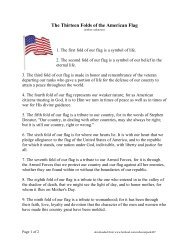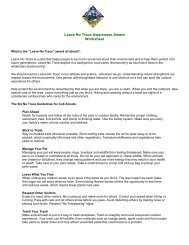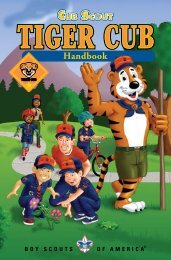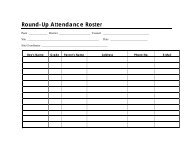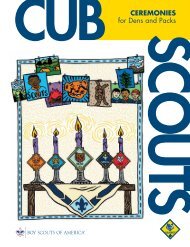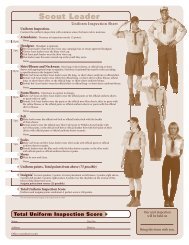BSA Guide To Safe Scouting 34416 - Hot4CAD Online
BSA Guide To Safe Scouting 34416 - Hot4CAD Online
BSA Guide To Safe Scouting 34416 - Hot4CAD Online
- No tags were found...
You also want an ePaper? Increase the reach of your titles
YUMPU automatically turns print PDFs into web optimized ePapers that Google loves.
Council ProgramsWhen scuba diving is taught in connection with any localcouncil program, instructors should provide the training on acontract basis. Such instructors should have dive store or othercommercial affiliation that provides liability insurance coverage.Direct employment of scuba instructors is not recommended.Local council programs may not compress or sell airfor scuba use, or sell, rent, or loan scuba equipment (scubacylinders, regulators, gauges, dive computers, weights, orBCDs). All air and equipment for local council program usemust be obtained from professional sources (dive stores,resorts, dive boats, etc.) affiliated with a scuba agency recognizedby the <strong>BSA</strong>.Scuba equipment may be used by certified summer campaquatics program personnel for installation and maintenanceof waterfront equipment, or for search and recoveryoperations. Search and recovery could include lost equipment,as well as rescue efforts.Recognized AgenciesRecognized agencies are:• PADI: Professional Association of Diving Instructors• NAUI: National Association of Underwater Instructors• SSI: Scuba Schools International• IDEA: International Diving Educators Association• PDIC: Professional Diving Instructors Corporation• SDI: Scuba Diving International• YMCA Scuba Program (discontinued in 2008, but certificationcards are still recognized)• NASDS: National Association of Scuba Diving Schools(merged with SSI, but certification cards arestill recognized)In addition to the agencies listed by name, any currentmember of the World Recreational Scuba TrainingCouncil (WRSTC), which includes all RSTC members, isalso recognized.Other agencies wishing to be recognized by the <strong>BSA</strong> maycontact the Outdoor Programs Team of the national office.Recognition by a certifying body such as the RSTC or EUFthat the agency adheres to ANSI/CEN/ISO standards wouldbe expected.<strong>Safe</strong>ty Afloat<strong>BSA</strong> groups shall use <strong>Safe</strong>ty Afloat for all boating activities.Adult leaders supervising activities afloat must have completed<strong>Safe</strong>ty Afloat training within the previous two years. Cub Scoutactivities afloat are limited to council or district events that do notinclude moving water or float trips (expeditions). <strong>Safe</strong>ty Afloatstandards apply to the use of canoes, kayaks, rowboats, rafts,floating tubes, sailboats, motorboats (including waterskiing),and other small craft, but do not apply to transportation on largecommercial vessels such as ferries and cruise ships. Parasailing(being towed airborne behind a boat using a parachute), kitesurfing(using a wakeboard towed by a kite), and recreational useof personal watercraft (small sit-on-top motorboats propelled bywater jets) are not authorized <strong>BSA</strong> activities.<strong>Safe</strong>ty Afloat training may be obtained from the <strong>BSA</strong> <strong>Online</strong>Learning Center at www.scouting.org, at council summer camps,and at other council and district training events. Confirmation oftraining is required on local and national tour permits for tripsthat involve boating. Additional guidance on appropriate skilllevels and training resources is provided in the AquaticsSupervision guide available from council service centers.1. Qualified SupervisionAll activity afloat must be supervised by a mature andconscientious adult age 21 or older who understandsand knowingly accepts responsibility for the wellbeingand safety of those in his or her care and who istrained in and committed to compliance with the ninepoints of <strong>BSA</strong> <strong>Safe</strong>ty Afloat. That supervisor must beskilled in the safe operation of the craft for the specificactivity, knowledgeable in accident prevention, andprepared for emergency situations. If the adult with<strong>Safe</strong>ty Afloat training lacks the necessary boat operatingand safety skills, then he or she may serve as thesupervisor only if assisted by other adults, camp staffpersonnel, or professional tour guides who have theappropriate skills. Additional leadership is providedin ratios of one trained adult, staff member, or guideper 10 participants. For Cub Scouts, the leadershipratio is one trained adult, staff member, or guide perfive participants. At least one leader must be trainedin first aid including CPR. Any swimming done inconjunction with the activity afloat must be supervisedin accordance with <strong>BSA</strong> <strong>Safe</strong> Swim Defense standards.It is strongly recommended that all units have at leastone adult or older youth member currently trained in<strong>BSA</strong> Aquatics Supervision: Paddle Craft <strong>Safe</strong>ty to assistin the planning and conduct of all activities afloat.2. Personal Health ReviewA complete health history is required of all participants asevidence of fitness for boating activities. Forms for minorsmust be signed by a parent or legal guardian. Participantsshould be asked to relate any recent incidents of illness orinjury just prior to the activity. Supervision and protectionshould be adjusted to anticipate any potential risks associatedwith individual health conditions. For significanthealth conditions, the adult supervisor should requirean examination by a physician and consult with parent,guardian, or caregiver for appropriate precautions.12The online version of the <strong>Guide</strong> to <strong>Safe</strong> <strong>Scouting</strong> is updated quarterly.Go to http://www.scouting.org/Healthand<strong>Safe</strong>ty/GSS.aspx.



